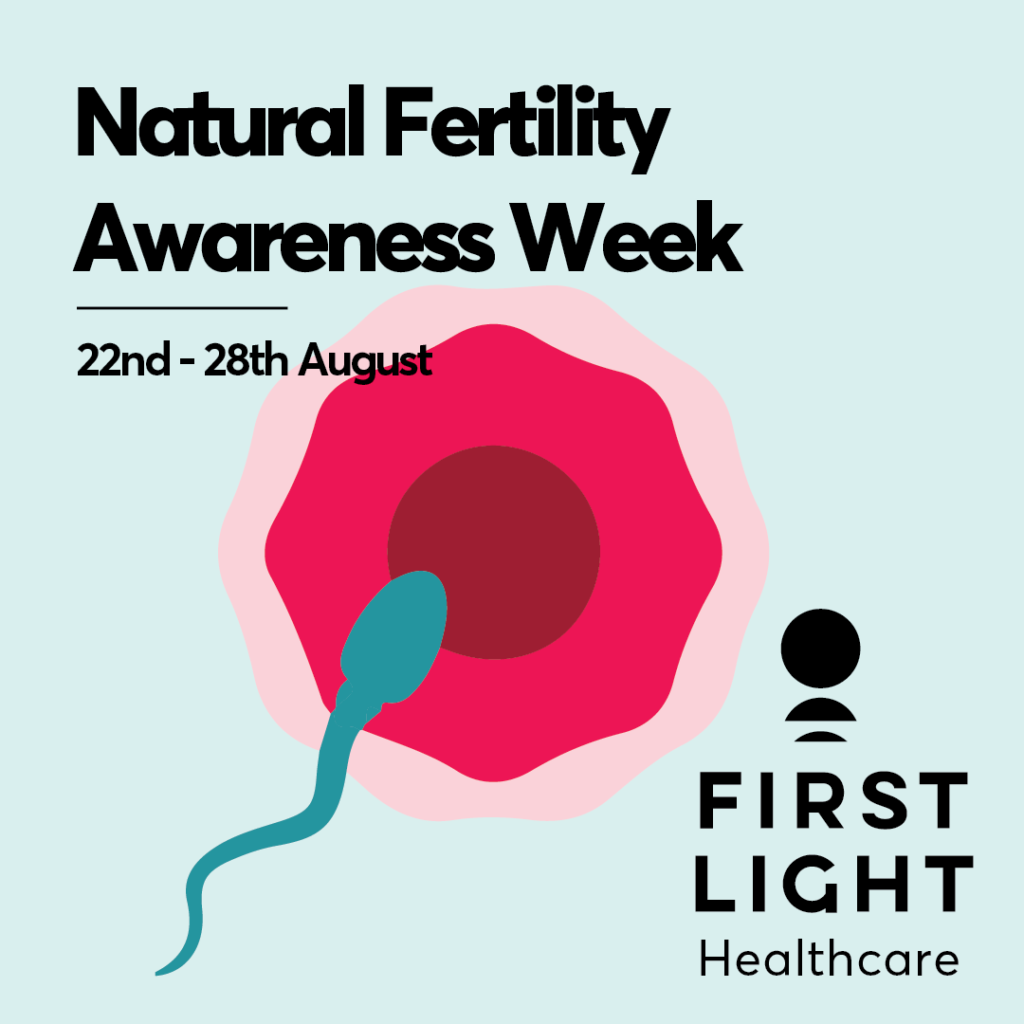Natural Fertility Awareness Week
22nd – 28th August 2022

Regardless of race, religion, sexuality or economic status, anyone can be challenged when it comes to creating a family. National Fertility Awareness Week unites millions of people who want to remove the stigmas and barriers that stand in the way of building a family. *****
Most young Australians want to have at least one baby at some stage. But sometimes that dream is harder than they expect to achieve– and that is the focus of this year’s National Fertility Awareness Week. **
There are many factors that can impact your chance of having a baby, including your age, weight and health. Some people may also have medical conditions that can make it difficult to conceive or carry a pregnancy. For those in the LGBTIQA+ community, they may wish to become a parent, and that can require fertility preservation or donor eggs or sperm. **
Unlike previous generations, many people leave plans for pregnancy until later in their adult lives. Women are naturally more fertile in their 20s, but as more women are increasingly choosing to have children when they are older, it can be more difficult to conceive.
What Age Is a Woman Most Fertile?
Both men and women can have problems with fertility as they get older. Women are born with all their eggs in their ovaries. The woman’s eggs are released throughout her adult life until menopause, but as a woman ages, so do her eggs, and eventually, they run out. Women find it harder to get pregnant after 35 of age as they have fewer eggs – and these eggs are typically of a lower quality. **
Women who are older also have higher rates of pregnancy complications such as:
- Miscarriage
- Gestational diabetes
- Stillbirth
- Genetic abnormalities – including Down Syndrome
Women are most fertile when they are under the age of 35. If you are trying to become pregnant, you are most likely to be successful when you are younger. As a result, some women choose to freeze their eggs if they do not have a partner, though this can be expensive, and it is not a guarantee of a later successful pregnancy.
What age is a man most fertile?
The quality of a man’s sperm may decrease as he gets older. There are also higher rates of miscarriage in pregnancies where the man is over 45 years old. It can also take longer for a woman to get pregnant if her partner is over 40 years old.
When is a Woman Most Fertile?
To increase the chances of becoming pregnant by natural fertility means it is recommended that a couple have sex every two to three days during the woman’s most naturally fertile period. Most women will ovulate about 14 days before their next period. This increases the chance of sperm meeting with the egg.
To increase the chances of becoming pregnant it is recommended that a couple have sex every 2-3 days during the fertile period to increase the chance of sperm meeting with the egg. A woman is most fertile at the time of ovulation. Sperm can live for up to 5 days in the fallopian tubes so having sex before ovulation can increase the chance of the egg being fertilised as the egg only survives for 24 hours after being released. *
A woman can only get pregnant during the ‘fertile window’ in the menstrual cycle. *
There are a few ways to work out when you’re ovulating. Your chance of getting pregnant is dramatically increased if you have sex on the day of ovulation, or two days before that date. It can be helpful to use a calendar or a smartphone app to track the menstrual cycle, plus there are simple ovulation calendars available online. Ovulation kits can also be bought online or from a pharmacy. These kits use either urine or saliva to detect hormone levels, however, they can be expensive. *
How Can You Improve Your Chances of Conceiving?
- Having sex as close as possible to the time of ovulation increases the chance of pregnancy.
- If a woman has sex six or more days before she ovulates, the chance she will get pregnant is virtually zero.
- If she has sex five days before she ovulates, her probability of pregnancy is about 10 percent.
- If she has sex on the day of ovulation, or the two days before, the chance of getting pregnant is around 30 percent.
- These are average figures and depend on a woman’s age.*
Not Smoking Before or During Pregnancy
Smoking tobacco (including passive smoking) can decrease both female and male fertility. Smoking cannabis can also have an impact on sperm production.
For women, smoking can:
- Affect the transportation of the egg to the uterus
- Interrupt hormones
- Affect the blood vessels in the placenta which can affect baby’s growth
- Increase chances of miscarriage or stillbirth
- Increase the chances of childhood asthma
Men who smoke have:
- Higher rates of erectile dysfunction
- A lower sperm count
- Lower sperm quality
The Impact of Alcohol and Drug Use on Fertility
Australian health guidelines recommend that women should not drink alcohol when trying to get pregnant. Alcohol can reduce fertility for both men and women.
Alcohol intake can:
- Increase the time it takes to get pregnant
- Reduce the quality of a man’s sperm
- Reduce the quality of a woman’s eggs
Drugs such as cocaine, heroin, cannabis and ecstasy can also make it harder to get pregnant.
How Can I Boost My Fertility Naturally?
Before trying to get pregnant, you should try to be as healthy as possible. Most doctors will recommend you make an appointment before you’re pregnant. At this preconception visit, you can talk about existing health problems and get screened for genetic diseases. You can also address other health concerns you might have and discuss how you can improve your fertility and your health when pregnant.
Your diet and weight
A healthy diet and regular exercise can improve both male and female fertility. Being either overweight or underweight can affect fertility. Women who are either overweight or underweight may also not ovulate as regularly as a woman who is a healthy weight.
There are also higher risks of miscarriage and pregnancy complications, such as high blood pressure and diabetes of pregnancy for women who are overweight. For women, being overweight can also alter the hormone levels that affect the menstrual cycle and egg quality. And for men, being overweight can reduce the quality of their sperm, as well as causing erection problems.
Being overweight can also reduce libido (sex drive) for both men and women. **
Losing even a few kilos if you are overweight can improve your fertility. If you are a man or woman who is overweight or underweight it can take longer to conceive.
Eating a healthy, balanced diet and exercising regularly are two of the best things you can do to improve your overall health and fertility. Both habits of eating well and exercising contribute to a healthy weight, which increases your chance of a pregnancy and of having a healthy baby. **
What is considered healthy eating for conceiving and pregnant women?
If you want to eat a healthy, balanced diet, try lots of fresh vegetables and fruit, whole grains, legumes, fish and olive oil and very little red meat. This type of eating is linked to better health outcomes that can also boost fertility.
It is also recommended that you switch to whole-grain carbs and use healthy fats wherever possible. Avoid deep-fried food, and fish that have higher levels of mercury as it can affect their unborn baby’s health. Reduce your intake of red meat and replace it with lean protein choices such as fish, chicken, or beans.
It is also recommended that you consume some dairy in your diet, such as plain Greek yogurt (with low sugar), plus small amounts of cheeses. Limit drinks with lots of sugar, plus your intake of sugary biscuits, cakes, ice-cream and sweets. **
For women to increase the chance of fertility and to maintain a healthy pregnancy:
- Aim for and maintain a healthy weight
- Eat a healthy, balanced diet
- Don’t drink alcohol
- Take folate and iodine and any other supplements as directed by your doctor
- Do not smoke
- Engage in regular, moderate exercise
It’s not about having a perfect body – just a healthy body, because healthier parents have healthier babies. **
What can a man do to improve fertility?
- Aim for a healthy weight
- Eat a healthy, balanced diet
- Do regular exercise
- Don’t drink alcohol, or at a minimum limit your alcohol intake
- Don’t smoke
What vitamin and mineral supplements are important for women before pregnancy?
We know that vitamins and minerals are essential for our health, but the best source of these is a healthy diet. However, it is recommended that a woman who is planning a pregnancy should supplement their diet with folate and iodine. You can talk to your GP or nutritionist for more information about the appropriate supplements for your condition.
Women planning a pregnancy should also supplement their diet with folate and iodine – micronutrients that reduce the risk of birth defects. **
Improve Your Fitness to Improve Your Fertility
If you or your partner are overweight or obese, losing even a few kilos can improve your chance of getting pregnant. Research shows that if couples get healthier together, there’s a better chance of success. Having support from a partner, family or friend can also help you to set up and maintain healthy lifestyle habits for the future. If you are underweight, consult your GP about factors that might be contributing. **
Men who eat a healthy diet and exercise regularly can increase the quality of their sperm. **
Experts recommend being active every day to maintain a healthy weight. If you do no physical activity right now, start by doing some, then slowly build it up to the recommended amount. While studies show that exercise boosts female fertility it is important to note that a large amount of very high intensity exercise may reduce fertility and the chance of having a baby with fertility treatment. So, it’s a good idea to avoid very high intensity exercise, such as marathon running, while trying for a baby.
How Does Endometriosis Affect Fertility?
Endometriosis can affect fertility in a variety of ways. As the disease progresses and the damage to the pelvic can impact the Fallopian tubes, which are the passage of sperm and eggs through the pelvis.
Similarly, a change in the pelvic environment can occur, most likely resulting from the endometriosis-related inflammation. These inflammatory substances can impair the function of both eggs and sperm, fertilization, embryo development and implantation.
There is also evidence that the quality and quantity of eggs in women with endometriosis can be affected. Some of the treatments for endometriosis, whether they be medical or surgical, can also affect fertility.****
What is In Vitro Fertilisation (IVF)?
In vitro fertilization (IVF) involves retrieving eggs from a woman’s ovaries and fertilizing them with sperm. This fertilized egg is known as an embryo. The embryo can then be frozen for storage or transferred to a woman’s uterus. Depending on your situation, IVF can use your eggs and your partner’s sperm, your eggs and donor sperm, or donor eggs and the male partner’s sperm, or donor eggs, donor sperm and donated embryos.
Your doctor can also implant embryos in a surrogate (gestational) carrier – this is a woman who carries your baby for you. IVF is expensive and invasive, so couples often try other fertility treatments first including taking fertility drugs or having intrauterine insemination. Some parents may also opt for IVF if they are at risk of passing on a genetic disorder on to their baby. Medical labs can now test embryos for genetic abnormalities. Based on these results, a doctor would choose to implant embryos without genetic defects. ***
Infertility issues for which IVF may be necessary include:
- Reduced fertility in women over the age of 40
- Blocked or damaged fallopian tubes
- Reduced ovarian function
- Endometriosis
- Uterine fibroids
- Male infertility, such as low sperm count or abnormalities in sperm shape
- Unexplained infertility
When Should I Seek Help?
Most healthy couples will conceive within a year of actively trying to get pregnant. If you don’t get pregnant within a year and are under age 35, you should see your doctor for a fertility evaluation. If you’re over 35, you should only wait six months before seeing a doctor. Couples should also see a fertility specialist if they have a history of multiple miscarriages or if they have a genetic or medical condition that might affect their fertility.
If you think you may have fertility issues, it is important to talk to your doctor as soon as possible.
RESOURCES:
Family Planning NSW Talk line: Phone: 1300 658 886 or: www.fpnsw.org.au/talkline
TIS National’s immediate interpreting service: Phone: 131 450
Andrology Australia: www.andrologyaustralia.org
Fertility Coalition: www.yourfertility.org.au
SOURCES:
* https://www.yourfertility.org.au/everyone/timing
*** https://www.healthline.com/health/in-vitro-fertilization-ivf#purpose
**** https://www.endometriosisaustralia.org
***** https://www.healthline.com/health/pregnancy/
******https://www.billings.life/en/



